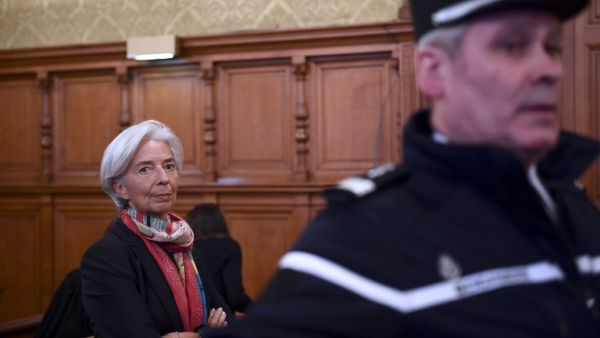A French court found International Monetary Fund (IMF) chief Christine Lagarde guilty Monday of negligence over an arbitration payout made when she was finance minister, but did not hand down punishment.
While the court did not fault Lagarde for giving a green light to arbitration proceedings in 2007, it found her guilty of failing to file an appeal of the decision by the arbitration panel, which awarded business mogul Bernard Tapie 403 million euros (420 million dollars) in 2008.
Noting her "international reputation" and the fact that the decisions in question were made when Lagarde was dealing with the fallout of the 2008 global financial crisis as a member of the French government, the court did not pass down a sentence or fine.
Following the decision, the IMF executive board said it had reaffirmed "its full confidence in the managing director’s ability to continue to effectively carry out her duties."
The board, which appoints and conducts oversight over the managing director, said its decision was based on "all relevant factors," including Lagarde's "outstanding leadership of the fund and the wide respect and trust for her leadership globally."
For her part, Lagarde said she was "not satisfied" by the court's finding, but the time had come to move on.
She said she was "very happy to not appeal this decision" and to "focus all my attention ... to my mission as head of the IMF."
Lagarde, 60, will not have a criminal record as a result of the decision, her defence lawyer Patrick Maisonneuve told reporters outside the court after the judgement was announced. She had faced up to a year in prison and a fine of 15,000 euros.
"It's true that we would have preferred a pure and simple acquittal," Maisonneuve said. "But it's important to understand that the court decided not to sentence Madame Lagarde to any punishment."
Lagarde continued working Monday, telephoning with Ukrainian President Petro Poroshenko to voice support for his nationalization of the country's largest bank over concerns of instability in the domestic financial system.
Following the court's judgement, French Finance Minister Michel Sapin said the government retained full trust in her. In a statement from his office, he pointed out that the decision related to Lagarde's actions before she took up the helm of the IMF.
"Christine Lagarde exercises her mandate at the IMF with success, and the government retains full trust in her capacity to carry out her responsibilities," Sapin's office said.
The judgement was passed by the Court of Justice of the Republic, a special court made up of professional magistrates and elected officials which investigates and prosecutes allegations of wrongdoing by ministers in the course of their duties.
Lagarde was in Washington when the ruling was handed down after appearing before the court last week. She has maintained that she is not culpable of wrongdoing.
Her lawyer said they were looking into the possibility of appealing the case to France's highest court.
In 2007, Lagarde signed off on arbitration proceedings to conclude a years-long dispute between Tapie and a public consortium in charge of former state-owned bank Credit Lyonnais' liabilities.
The dispute had started with the 1993 sale of Tapie's shares in sportswear manufacturer Adidas, which he later alleged to have been mishandled by Credit Lyonnais.
But in February 2015, the Court of Appeal of Paris overturned the arbitration award issued to Tapie because of connections between Tapie's lawyers and one of the members of the arbitration panel.
Lagarde's defence team argued during the latest trial that there had been no reason to doubt the arbitration panel members at the time.








